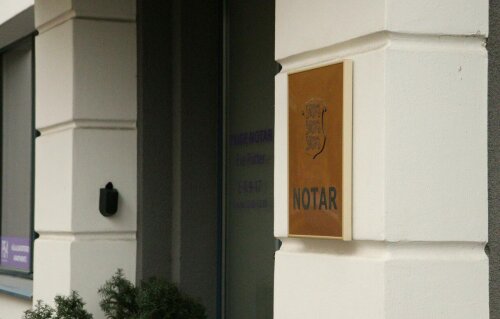Best Private Client Lawyers in Estonia
Share your needs with us, get contacted by law firms.
Free. Takes 2 min.
Or refine your search by selecting a city:
List of the best lawyers in Estonia
About Private Client Law in Estonia
Private client law in Estonia encompasses a wide array of legal services tailored to individuals, families, and their estates. These services are designed to help clients manage, transfer, and protect personal wealth and assets both during their lifetime and after death. The field covers areas such as succession and inheritance, family law, wills and estate planning, trusts, tax matters, family businesses, and sometimes immigration and relocation. Estonian private client law is influenced by both local legal traditions and European Union regulations, which makes it important to understand the local nuances as well as cross-border issues.
Why You May Need a Lawyer
There are numerous situations in which a private client lawyer can provide essential guidance and support in Estonia. Some common scenarios include:
- Drafting a legally valid will in accordance with Estonian law
- Estate planning to ensure assets are distributed according to your wishes
- Managing the inheritance process, including probate and estate administration
- Navigating cross-border succession where assets or heirs are located in different countries
- Advice on family law matters, such as marriage contracts or divorce settlements involving significant assets
- Establishing and administering family trusts or foundations
- Tax planning to optimize personal or family wealth
- Resolving disputes among heirs or beneficiaries
- Assisting with the transfer of family businesses
- Complying with regulatory requirements for anti-money laundering and tax reporting
The complexity of these matters, and the potential for conflicts or misunderstandings, make legal advice vital.
Local Laws Overview
Private client law in Estonia is primarily governed by the Estonian Civil Code, the Law of Succession Act, the Family Law Act, and related tax legislation. Some of the key aspects include:
- Succession Law - The Law of Succession Act outlines how inheritances are handled. It recognizes both testate succession (with a will) and intestate succession (without a will). Estonian law generally supports freedom of testation but includes certain reserved shares for close relatives.
- Wills - Wills must meet specific formal requirements to be valid in Estonia, such as being notarized or handwritten and correctly signed.
- Family Law - The Family Law Act covers matters such as marriage, divorce, maintenance, division of property, and the legal status of children.
- Taxation - Inheritance and gifts are subject to specific tax rules. Generally, inheritances are not taxed at the recipient level, but some exceptions and related taxes may apply.
- Trusts and Foundations - Estonia recognizes private law foundations, but common law trusts are not native to Estonian law. However, foundations can serve similar purposes in asset protection and management.
- International Aspects - European regulations, such as the EU Succession Regulation, influence how cross-border succession cases are handled.
Frequently Asked Questions
What documents are required to write a will in Estonia?
A will in Estonia must be written and signed by the testator. It can be notarial (executed before a notary), secret notarial (deposited with a notary), or a handwritten will. Each format has its own legal requirements, so consulting a lawyer is advised.
Who can inherit under Estonian law?
In the absence of a will, inheritance generally passes to close relatives, such as spouses, children, and parents under the Law of Succession Act. The specific order and share depend on the familial relationship.
Are foreign wills recognized in Estonia?
Foreign wills can be recognized in Estonia if they comply with the formal requirements applicable in the place where they were made, according to the EU Succession Regulation and Estonian law. Legal review is recommended to avoid complications.
Is inheritance taxed in Estonia?
No inheritance tax is levied on beneficiaries in Estonia. However, other taxes such as income tax or transfer taxes can sometimes apply, depending on the nature of inherited assets and their subsequent use.
Can an heir refuse an inheritance?
Yes, an heir in Estonia may renounce an inheritance by submitting a formal declaration within a specific period after learning about the inheritance.
How can I protect my assets for my family?
Asset protection for families can be arranged through careful estate planning, creating valid wills, establishing foundations, and considering marital property agreements. A lawyer can help tailor strategies to your situation.
What happens if there is a dispute over a will?
If a will is contested, the dispute is typically resolved through negotiation, mediation, or, if necessary, by the courts. The process may involve scrutiny of the will's validity and the intentions of the testator.
Do I need a lawyer for probate?
While it is not mandatory to have a lawyer for probate proceedings, due to the complexity of Estonian succession law and procedural requirements, legal assistance is strongly recommended.
Can I set up a trust in Estonia?
Traditional trusts are not part of Estonian law, but private law foundations can be established for asset protection or management purposes. These serve many similar functions as trusts in other jurisdictions.
How long does inheritance process take in Estonia?
The time required to settle an estate can vary greatly, depending on the complexity and whether any disputes arise. Simple cases may be resolved in a few months, while complex or contested estates can take significantly longer.
Additional Resources
If you are seeking information or assistance regarding private client matters in Estonia, the following resources may be helpful:
- The Estonian Chamber of Notaries - Information on wills, succession, and notarial procedures
- The Estonian Ministry of Justice - Provides guidance on family and succession law
- The Estonian Bar Association - Directory of qualified lawyers specializing in private client matters
- Estonian Tax and Customs Board - Information on taxation of gifts, inheritances, and family businesses
- Civic advice organizations - Offer basic guidance on family, inheritance, and related legal questions
Legal professionals can also help connect you with the appropriate governmental offices or registries.
Next Steps
If you require legal advice or assistance with private client matters in Estonia, consider the following steps:
- Identify the specific issue or area where you need help, such as estate planning, inheritance, or family law
- Gather all relevant documents, such as identification, property records, family registers, previous wills, or financial information
- Contact a qualified legal professional specializing in private client law. The Estonian Bar Association maintains a list of experienced lawyers
- Arrange a consultation to discuss your situation, objectives, and possible legal strategies
- Follow the guidance of your lawyer and maintain communication to ensure all documentation and legal steps are correctly completed
Taking these actions will help protect your interests, ensure compliance with Estonian law, and give you peace of mind regarding your personal and family affairs.
Lawzana helps you find the best lawyers and law firms in Estonia through a curated and pre-screened list of qualified legal professionals. Our platform offers rankings and detailed profiles of attorneys and law firms, allowing you to compare based on practice areas, including Private Client, experience, and client feedback.
Each profile includes a description of the firm's areas of practice, client reviews, team members and partners, year of establishment, spoken languages, office locations, contact information, social media presence, and any published articles or resources. Most firms on our platform speak English and are experienced in both local and international legal matters.
Get a quote from top-rated law firms in Estonia — quickly, securely, and without unnecessary hassle.
Disclaimer:
The information provided on this page is for general informational purposes only and does not constitute legal advice. While we strive to ensure the accuracy and relevance of the content, legal information may change over time, and interpretations of the law can vary. You should always consult with a qualified legal professional for advice specific to your situation.
We disclaim all liability for actions taken or not taken based on the content of this page. If you believe any information is incorrect or outdated, please contact us, and we will review and update it where appropriate.
Browse private client law firms by service in Estonia
Estonia Attorneys in related practice areas.
Browse private client law firms by city in Estonia
Refine your search by selecting a city.
















